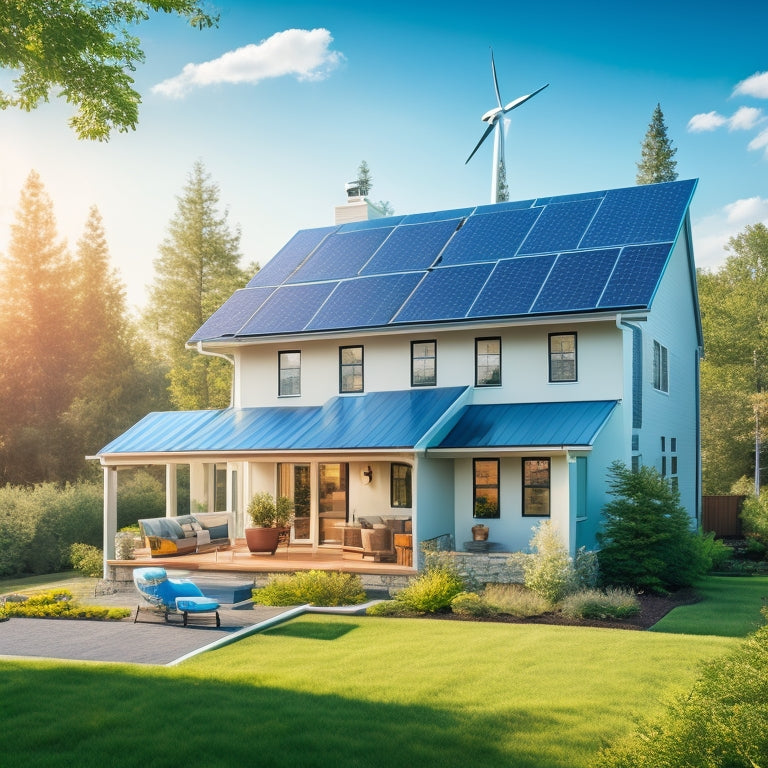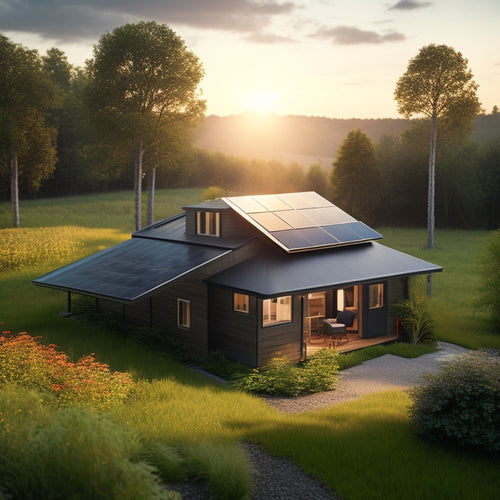
5 Best Energy Independence Systems for Homes
Share
You're seeking energy independence, and with the right system, you can break free from reliance on traditional grids and enjoy a sustainable, cost-effective power supply. Portable solar panel systems offer on-the-go electricity, while whole house energy storage provides reliable backup power during outages. Solar power backup generators utilize renewable energy, and grid-tie inverter systems enable selling excess energy back to the grid. Off-grid energy independence kits offer all-encompassing solutions for generating and storing energy without grid reliance. By understanding the benefits and components of each system, you'll be better equipped to choose the one that best fits your energy needs and moves you closer to achieving true energy autonomy.
Key Takeaways
- Portable solar panel systems provide reliable energy on-the-go, ideal for camping, RVs, and remote cabins, with considerations for power output, durability, and weight.
- Whole house energy storage systems offer backup power during outages, enhancing energy efficiency, with key features including capacity, depth of discharge, and round-trip efficiency.
- Solar power backup generators provide a dependable renewable energy source during outages, with daytime charging and maintenance requirements for peak performance.
- Grid-tie inverter systems enable selling excess energy back to the grid, offsetting energy bills, with proper sizing and panel orientation essential for efficiency.
- Off-grid energy independence kits provide comprehensive solutions for generating and storing energy without grid reliance, with customization options based on energy needs, climate, and available space.
Portable Solar Panel Systems
Many homeowners are turning to portable solar panel systems as a reliable means of generating electricity on-the-go. You can benefit from this technology by investing in a portable solar panel system that suits your needs.
They provide significant savings by reducing reliance on traditional fuel sources reducing carbon footprint, and are ideal for off-grid excursions. These systems typically consist of a solar panel, a charge controller, and a battery. You can also add solar accessories, such as a power inverter, to enhance the system's functionality.
Portable solar panels are ideal for camping trips, RVs, or remote cabins. They're also useful for emergency backup power during grid outages.
When choosing a portable solar panel system, consider factors such as power output, durability, and weight. Look for systems with high-efficiency solar panels and advanced charge controllers for peak performance.
Whole House Energy Storage
With a growing desire for energy independence, nearly 70% of homeowners are exploring alternatives to traditional power grids. Whole house energy storage systems offer a reliable solution, providing a backup power source during outages and optimizing energy efficiency. These systems typically consist of advanced battery technology, inverters, and monitoring systems. When selecting a whole house energy storage system, consider the following key factors:
| Feature | Description |
|---|---|
| Capacity | The total amount of energy the system can store, typically measured in kilowatt-hours (kWh) |
| Depth of Discharge (DOD) | The percentage of the battery's capacity that can be safely used without damaging the cells |
| Round-Trip Efficiency | The percentage of energy that is retained during a charge/discharge cycle |
| Compatibility | Verify the system is compatible with your existing electrical infrastructure and renewable energy sources |
Solar Power Backup Generators
In the event of a power outage, solar power backup generators can provide a dependable and renewable source of energy to your home.
These systems typically consist of a solar panel array, a battery bank, and an inverter. During the day, the solar panels charge the batteries, which can then power your home at night or during an outage.
When selecting a DIY solar system, it's vital to evaluate high-efficiency panels and extensive warranties to guarantee peak performance.
To guarantee peak performance, it's important to perform regular solar panel maintenance, such as cleaning and inspecting the panels for damage.
Additionally, energy efficiency upgrades, like installing LED lighting and Energy Star appliances, can help minimize your energy consumption and maximize the efficiency of your solar power backup generator.
Grid-Tie Inverter Systems
Utilizing the full potential of your solar panel array requires a dependable and efficient grid-tie inverter system. This system enables you to sell excess energy back to the grid and offset your energy bills.
When considering a grid-tie inverter system, you should be aware of the following:
-
Grid tie advantages: net metering, reduced energy bills, and potential revenue from selling excess energy
-
Grid tie challenges: reliance on grid connectivity, potential for grid outages, and complex installation requirements
-
To guarantee peak energy production, proper sizing and panel orientation are vital maximizing efficiency regardless of the system type.
-
Consider investing in quality kits that include high-efficiency solar panels, sturdy charge controllers, and deep-cycle batteries to guarantee a consistent energy flow.
-
Confirm your system is compatible with your local utility company's grid requirements
-
Monitor your energy production and consumption in real-time to enhance your system's performance
- Regularly maintain and inspect your system to prevent technical issues and enhance its lifespan
Off-Grid Energy Independence Kits
As you venture further into energy independence, you may find that off-grid energy independence kits are the ideal solution for your home.
These kits provide an all-encompassing package that includes solar panels, wind turbine systems, and other necessary components to generate and store energy. They're designed to be self-sufficient, allowing you to power your home without relying on the grid.
Off-grid kits often include solar water heaters, which can reduce your energy consumption even further.
When selecting an off-grid kit, consider your energy needs, climate, and available space. Look for kits with high-efficiency components, durable materials, and extensive warranties.
Frequently Asked Questions
How Do I Determine My Energy Independence Goals and Requirements?
You'll determine your energy independence goals by evaluating your current energy usage, identifying areas for reduction, and setting targets for renewable energy generation; then, you'll calculate your energy requirements based on your goals, climate, and appliances' energy demands.
Can I Install an Energy Independence System Myself or Diy?
You can attempt a DIY energy independence system, but it's essential to assess your electrical and mechanical skills before installing DIY Solar panels or Wind Turbines, as improper installation can lead to safety hazards and reduced efficiency.
What Are the Maintenance and Repair Costs for Energy Independence Systems?
You'll be surprised to know that 80% of solar panels still operate at 90% efficiency after 25 years. When it comes to maintenance, you'll pay around $1,500 to $3,000 annually for solar panel maintenance, and battery replacement costs can range from $5,000 to $15,000 every 5-10 years.
Are Energy Independence Systems Compatible With My Existing Electrical Setup?
You'll need to assess your existing electrical setup's grid integration to determine system compatibility; a professional evaluation is recommended to guarantee seamless integration with your home's infrastructure, avoiding potential electrical conflicts or safety hazards.
What Are the Local Building Codes and Permits Required for Installation?
As you commence this project, you'll need to traverse the local regulatory terrain, where permit processes can be a maze. Research local regulations, ensuring compliance with electrical and building codes, and prepare for the permit process to avoid costly delays.
Related Posts
-

Diy Off Grid Solar
By embracing DIY off-grid solar, you can break free from grid dependence, slashing your energy bills by up to 90% and...
-

Replacing Old Appliances With Sustainable Alternatives
Replacing old appliances with sustainable alternatives can change your home into an energy-efficient space. Not only ...
-

Top Solar Powered Camping Fans for Camping Enthusiasts
If you're a camping enthusiast, a solar-powered fan can be a transformative element for your outdoor experience. Thes...


